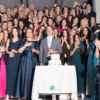
Maria Mpaziakou, BSc, MSc, Biologist
April is Testicular Cancer Awareness Month, dedicated to raising awareness, promoting prevention, and encouraging self-examination, particularly among men aged 15 to 34.
Testicular cancer, though rare, is the most common type of cancer affecting men of reproductive age. Early diagnosis of testicular cancer can lead to a survival rate of over 97%.
Raising awareness about testicular cancer and the importance of prevention is vital. The earlier the diagnosis, the higher the chances of successful treatment and full recovery. However, treatments such as surgery, chemotherapy, and radiation therapy can negatively impact sperm production and male fertility. The extent of fertility restoration depends on the type and intensity of treatment received. Some men regain their fertility two years after completing treatment. Others may experience long-term infertility.
Fertility preservation in the form of sperm cryopreservation is the most indicated preventive option for preserving fertility and the protecting the right for fatherhood in the future for these men.
Sperm cryopreservation is a safe and effective technique and allows for the storage of genetic material for future use.
The cryopreservation process follows these steps:
1. Sperm Collection: A sperm sample is collected through masturbation.
2. Sperm Analysis: The sample is evaluated under a microscope. If sperm count is low or absent, sperm retrieval directly from the testicles is recommended.
3. Cryopreservation: The sperm or testicular tissue is frozen in liquid nitrogen at -196°C and stored in a sperm bank for long-term preservation.
4. Future Use: When the individual decides to have children, the stored sample can be used in Assisted Reproductive Techniques (ART), such as In Vitro Fertilization (IVF).
The primary benefit of sperm or testicular tissue cryopreservation is the long-term preservation of genetic material without deterioration. Even decades later, frozen sperm can still lead to successful pregnancies.
For men facing testicular cancer, cryopreservation offers hope for future fatherhood. Consulting a fertility specialist before starting treatment can help secure reproductive options for the future.
Embryolab uses special sperm and testicular tissue cryopreservation protocols that ensure high levels of sperm survival. While a team of expert reproductive counsellors are dedicated to providing high priority guidance to men who are about to undergo toxic fertility treatments. Sperm samples are stored in purpose-built rooms supported by state-of-the-art systems that ensure the safety of the samples for as long as they need to remain in cryopreservation.





